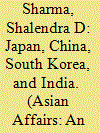|
|
|
Sort Order |
|
|
|
Items / Page
|
|
|
|
|
|
|
| Srl | Item |
| 1 |
ID:
101755


|
|
|
| 2 |
ID:
121594


|
|
|
|
|
| Publication |
2013.
|
| Summary/Abstract |
Although the subprime crisis regenerated interest in and stimulated debate about how to study the politics of global finance, it has not sparked the development of new approaches to International Political Economy (IPE), which remains firmly rooted in actor-centered models. We develop an alternative network-based approach that shifts the analytical focus to the relations between actors. We first depict the contemporary global financial system as a network, with a particular focus on its hierarchical structure. We then explore key characteristics of this global financial network, including how the hierarchic network structure shapes the dynamics of financial contagion and the source and persistence of power. Throughout, we strive to relate existing research to our network approach in order to highlight exactly where this approach accommodates, where it extends, and where it challenges existing knowledge generated by actor-centered models. We conclude by suggesting that a network approach enables us to construct a systemic IPE that is theoretically and empirically pluralist.
|
|
|
|
|
|
|
|
|
|
|
|
|
|
|
|
| 3 |
ID:
119951


|
|
|
|
|
| Publication |
2013.
|
| Summary/Abstract |
Focusing on a highly significant governmental intervention in the global financial market crisis - the US Treasury Department's Troubled Assets Relief Program (TARP) of autumn 2008 - this article makes a threefold contribution to the growing literature concerned with the interstices of finance and security. First, the TARP is shown to have attempted to govern the turbulence not simply as a crisis of the markets, the banks and Wall Street, but as a problem of the biopolitical security of the US population. US$700 billion worth of toxic assets were to be purchased by the TARP in order to restore the opportunities afforded by uncertain global financial circulations for individual wealth and well-being. Second, by conceptualizing and exploring the TARP in Foucauldian terms as an 'apparatus of security', the article demonstrates how this concept can hold together analytical concerns with the biopolitical rationality of power, on the one hand, and the contingent, processual and lively forms taken by specific governmental orderings, on the other. The TARP apparatus certainly amounted to a biopolitical intervention in the crisis, but it only emerged from the relation between the discursive, material and institutional elements that made it possible. Third, the unplanned transformation of the TARP into an apparatus that targeted bank solvency and recapitalization rather than toxic assets is held, in effect, to have been a key moment that heralded a move towards techniques of preparedness and resilience designed to mitigate the dangers of uncertain global financial circulations.
|
|
|
|
|
|
|
|
|
|
|
|
|
|
|
|
|
|
|
|
|